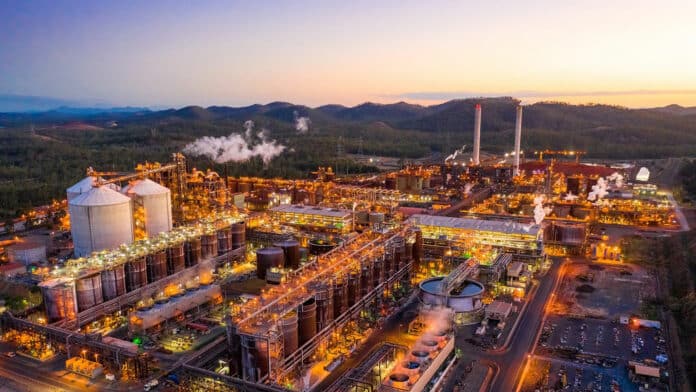Rio Tinto, an Anglo-Australian metals and mining company, has teamed up with Japan’s Sumitomo Corporation to build a first-of-a-kind green hydrogen plant in Australia. The agreement is part of a A$111.1 million Yarwun Hydrogen Calcination Pilot Demonstration Program aimed at lowering carbon emissions from the alumina refining process.
The program received the green light after a A$32.1 million co-funding boost from the federal government’s Australian Renewable Energy Agency (ARENA). It is aimed at demonstrating the viability of using hydrogen in the calcination process, where hydrated alumina is heated to temperatures of up to 1,000 degrees Celsius. The program involves the construction of a hydrogen plant at the refinery and the retrofit of refinery processing equipment.
The project will include the construction of a 2.5MW on-site electrolyzer to supply the hydrogen to the Yarwun alumina refinery and a retrofit of one of Yarwun’s four calciners so it can operate at times with a hydrogen burner. If adding that is successful, the program could pave the way for the adoption of the technology at scale globally.
The hydrogen plant will reduce Yarwun refinery’s carbon dioxide emissions by about 3,000 tonnes per year. It is also expected to produce the equivalent of about 6,000 tonnes of alumina per year.
“This pilot plant is an important step in testing whether hydrogen can replace natural gas in Queensland alumina refineries,” said Rio Tinto Aluminium Pacific Operations Managing Director Armando Torres. “At Rio Tinto, we have put the energy transition at the heart of our business strategy, and this is one of the ways we’re working towards decarbonizing our operations.”
Sumitomo will own and operate the electrolyzer at the Yarwun site and supply the hydrogen to Rio Tinto directly. Sumitomo said the electrolyzer would have a production capacity of more than 250 tonnes of hydrogen annually.
The company says it has already completed its front-end engineering and design study (FEED) in March 2022. The hydrogen plant and calciner construction will start in 2024, and the plant is expected to be in operation by 2025.
